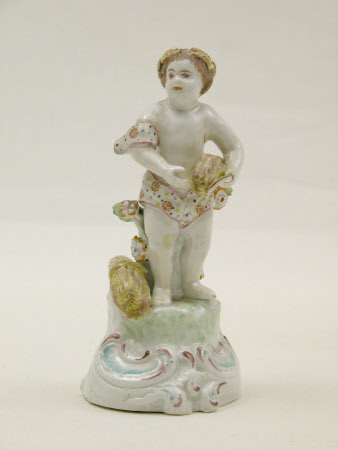The four seasons
Plymouth Porcelain Factory
Category
Ceramics
Date
1768 - 1770
Materials
Hard paste porcelain
Place of origin
Plymouth
Order this imageCollection
Saltram, Devon
NT 873161
Caption
Observation: These figures have been grouped as a set, probably by later auction houses. However, differences in their production show that they were not originally produced together. .1 Spring has a closed base. The others have open bases but a slight difference in the rococo work suggests that 3. Autumn is different again. 2. summer and 4. winter are most similar and have been sold together through Bearne's and also B&T Thorn & Sons, Budleigh Salterton.
Summary
A set of four figures of the four seasons made at the Plymouth porcelain factory 1768-1770. Hard paste porcelain moulded and assembled on a low roccoco base and decorated in polychrome enamels. Whilst these figures form a complete set, differences in their production show that they were not originally produced together.
Full description
The Plymouth Porcelain factory was established by William Cookworthy (1705-1780) in 1768. It was the first to produce so-called ‘hard paste’, or ‘true’ porcelain in the UK. This meant that it combined the materials of china clay (kaolin) and china stone (petunse) to produce a hard-fired body to the same recipe as Chinese porcelain. Many European factories attempted to re-create Chinese porcelain which was famed for its translucency and much in demand. The recipe for porcelain was a closely guarded secret. Only a handful of factories managed to re-create it, the first being Meissen in Germany in 1708. Cookworthy was a chemist based in Plymouth who experimented with the china clay he found in Cornwall. Tests and trial firings went on for over 20 years before he was finally able to establish industrial production in Plymouth in 1768. The factory produced a range of domestic and decorative wares in blue and white and in polychrome enamels. However, the factory was beset with manufacturing problems. Impurities in the materials, challenges with firing the kiln, and potters inexperienced in working with the new material meant that the quality of porcelain was extremely varied. The factory only ran for two years before it transferred to Bristol under the management of Richard Champion (1743-1791) in 1770.
Provenance
Bequeathed to the National Trust in 2003 by Miss Marion Ross Bethal.
Makers and roles
Plymouth Porcelain Factory, manufacturer



